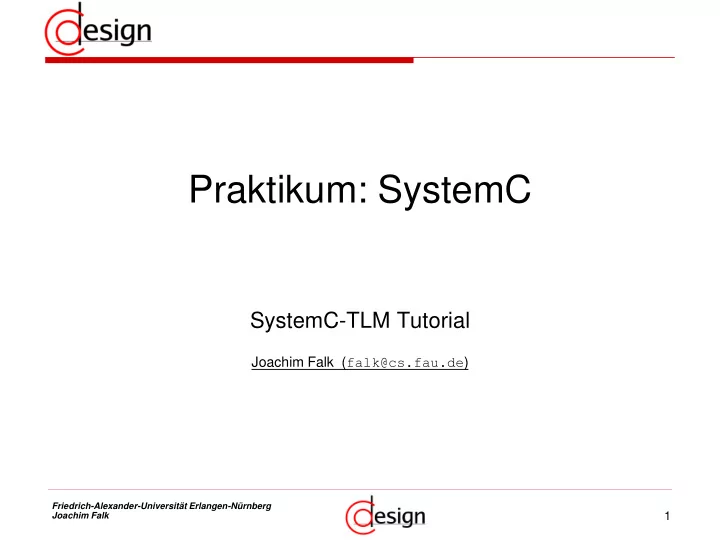

Praktikum: SystemC SystemC-TLM Tutorial Joachim Falk ( falk@cs.fau.de ) Friedrich-Alexander-Universität Erlangen-Nürnberg Joachim Falk 1
Agenda SystemC and TLM Transaction TLM 2.0 Overview Interfaces Examples Virtual Prototype Friedrich-Alexander-Universität Erlangen-Nürnberg Joachim Falk 2
SystemC/TLM C++ library that allows for high-level system modeling Provides Concepts - Modules - Ports - Channels - Processes - Events Data types Simulation kernel With it, modeling of communicating concurrently executed modules is easy SystemC TLM 2.0: Transaction level modeling Even more abstract modeling possible Friedrich-Alexander-Universität Erlangen-Nürnberg Joachim Falk 3
Agenda SystemC and TLM Transaction TLM 2.0 Overview Interfaces Examples Virtual Prototype Friedrich-Alexander-Universität Erlangen-Nürnberg Joachim Falk 4
Transaction? Transaction: Abstraction of communication Not transaction level: C function or single process Algorithmic model TL requires multiple processes to simulate concurrent execution and communication Note: Some slides and phrases are taken from OSCI documentation (available at www.systemc.org) OSCI TLM2 User Manual Slides from the TLM 2.0 kit Friedrich-Alexander-Universität Erlangen-Nürnberg Joachim Falk 5
Transaction on AHB Bus Opt1: Encapsulate protocol in a SystemC channel Opt2: Abstract timing to entire transactions: TLM 2.0 [http://infocenter.arm.com/help/index.jsp?topic=/com.arm.doc.dai0119e/index.html] Friedrich-Alexander-Universität Erlangen-Nürnberg Joachim Falk 6
Agenda SystemC and TLM Transaction TLM 2.0 Overview Interfaces Examples Virtual Prototype Friedrich-Alexander-Universität Erlangen-Nürnberg Joachim Falk 7
TLM 2.0 Open SystemC Initiative (OSCI) standard (June 2008) Mission: Standardize the way models communicate Why use TLM 2.0 in system level modeling? Standard for interoperability Early available High simulation speed Use cases for TLM Represents key architectural components of hardware platform Architectural exploration, performance modeling Software execution on virtual model of hardware platform Golden model for hardware functional verification Friedrich-Alexander-Universität Erlangen-Nürnberg Joachim Falk 8
The TLM 2.0 Classes Utilities: Convenience sockets Payload event queues Quantum keeper Generic payload Phases Instance-specific extn Initiator and target sockets TLM-2 core interfaces: TLM-1 standard Analysis ports Blocking transport interface Non-blocking transport interface Direct memory interface Debug transport interface Analysis interface IEEE 1666™ SystemC Friedrich-Alexander-Universität Erlangen-Nürnberg Joachim Falk 9 9
Coding Styles Guides to model writing Chosen style depends on use case Each style can support a range of abstraction across functionality, timing, and communication Loosely-timed Processes are temporally decoupled from simulation time (may run ahead) Each transaction has two timing points (begin and end) Approximately-timed Processes run in lock-step with simulation time: Delays annotated onto transactions cause waits or timed notifications Each transaction has four timing points (phases) Friedrich-Alexander-Universität Erlangen-Nürnberg Joachim Falk 10
Example CPU MemLo MemHi OpenRISC xKB yKB 1000 (TLM) Bus Friedrich-Alexander-Universität Erlangen-Nürnberg Joachim Falk 11
Initiators and Targets Initiator Target Initiator Target socket socket socket socket Initiator Target Forward Forward path path CPU Bus MEM Backward Backward path path Transaction object References to a single transaction object are passed along the forward and backward paths Friedrich-Alexander-Universität Erlangen-Nürnberg Joachim Falk 12 12
Agenda SystemC and TLM Transaction TLM 2.0 Overview Interfaces Examples Virtual Prototype Friedrich-Alexander-Universität Erlangen-Nürnberg Joachim Falk 13
Initiator and Target Sockets Initiator and target are connected via sockets Sockets group transport, DMI, and debug transaction interfaces bind forward and backward path with a single call Convenience: “simple” sockets Initiator Target socket socket b_transport () nb_transport_fw() Initiator Target get_direct_mem_ptr() transport_dbg() nb_transport_bw() invalidate_direct_mem_ptr() Friedrich-Alexander-Universität Erlangen-Nürnberg Joachim Falk 14 14
Blocking/Non-blocking Transport Blocking transport Typical usage: Loosely-timed coding style Parameter: Transaction and timing annotation Uses forward path only void b_transport(TRANS &, sc_time &); Non-blocking transport Typical usage: Approximately-timed coding style Parameter: Transaction, timing annotation, and phase Calls on forward- and backward-paths BEGIN_REQ tlm_sync_enum END_REQ nb_transport_fw(TRANS &, PHASE &, sc_time &); BEGIN_RESP tlm_sync_enum nb_transport_bw(TRANS &, PHASE &, sc_time &); END_RESP Friedrich-Alexander-Universität Erlangen-Nürnberg Joachim Falk 15
Transport Interfaces TLM2 transport interfaces pass transactions from initiators to targets Forward path Transaction is transported by b_transport ()/ nb_transport_fw () calls from the initiator to the target Traveling through interconnection network or fabric possible Transaction is executed in the target Backward path Blocking: Transaction “returns” to initiator carried with the return from the b_transport () calls as they unwind Non-blocking: Passed back by making explicit nb_transport_bw () calls in the opposite direction Friedrich-Alexander-Universität Erlangen-Nürnberg Joachim Falk 16
Blocking Transport Target Initiator Simulation time = 100ns b_transport(t, 0ns) Call Return b_transport(t, 0ns) b_transport(t, 0ns) Call Simulation time = 140ns wait(40ns) Return b_transport(t, 0ns) Initiator is blocked until return from b_transport Friedrich-Alexander-Universität Erlangen-Nürnberg Joachim Falk 17 17
Blocking - Temporal Decoupling Target Initiator Simulation time = 100ns Local time offset b_transport(t, 0ns) Call +5ns Return b_transport(t, 5ns) b_transport(t, 20ns) Call +20ns +25ns Return b_transport(t, 25ns) b_transport(t, 30ns) Call +30ns Simulation time = 140ns wait(40ns) +5ns Return b_transport(t, 5ns) Friedrich-Alexander-Universität Erlangen-Nürnberg Joachim Falk 18 18
Generic Payload Possible type of transaction Appropriate for memory mapped buses Attributes Typical attributes of MMBs (command, address, pointer, …) TLM specific (return status, DMI hint) Extensions (ignorable for interoperability) Most attributes are set by initiator and shall not be modified by interconnect components or the target; exceptions are Address (only interconnect, for example, a router) Response status (only target) If read command: data array by target Friedrich-Alexander-Universität Erlangen-Nürnberg Joachim Falk 19
Generic Payload Payload (transaction object) is “transported” by reference Memory management for the transaction object Ad hoc by the initiator (static, dynamic, automatic, pool strategy, etc.) Provide memory manager Initiators must not delete transactions until their lifetime ends Initiators are responsible for valid data pointers and corresponding memory management Friedrich-Alexander-Universität Erlangen-Nürnberg Joachim Falk 20
Agenda SystemC and TLM Transaction TLM 2.0 Overview Interfaces Examples Virtual Prototype Friedrich-Alexander-Universität Erlangen-Nürnberg Joachim Falk 21
Example (Loosely-timed Coding Style) struct Initiator: sc_module { tlm_utils::simple_initiator_socket<Initiator> socket; … }; struct Memory: sc_module { tlm_utils::simple_target_socket<Memory> socket; … }; SC_MODULE(Top) { Initiator initiator; Memory memory; Top(sc_module_name name) : sc_module(name), initiator(“initiator”), target(“target”) { initiator->socket.bind(memory->socket); } }; Friedrich-Alexander-Universität Erlangen-Nürnberg Joachim Falk 22
Example - Initiator int data; tlm::tlm_generic_payload trans; sc_time delay = sc_time(10, SC_NS); trans.set_write(); trans.set_address( 0x100 ); trans.set_data_ptr(reinterpret_cast<unsigned char*>(&data)); trans.set_data_length(sizeof(data)); trans.set_streaming_width(sizeof(data)); trans.set_byte_enable_ptr(0); trans.set_dmi_allowed(false); trans.set_response_status(tlm::TLM_INCOMPLETE_RESPONSE); initiatorSocket->b_transport(trans, delay); // check response status, perform delay Friedrich-Alexander-Universität Erlangen-Nürnberg Joachim Falk 23
Recommend
More recommend